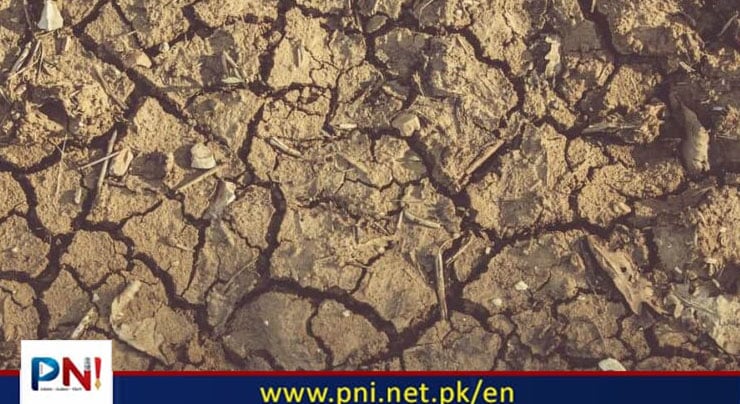MULTAN, Jun 23 (APP): Excessive and disproportionate use of chemical pesticides in agriculture damages the soil fertility, causes deficiency in essential nutrients resulting in decreased crop productivity and consequently affecting human health.
Since our farmers started using fertilizers in place of organic matter and pesticides to kill worms, insects and other harmful creatures, massive use of these chemicals showed to have adverse effects on our land as well as our health.
South Punjab is one of important regions in this respect being a food basket for the country where the agriculturalists have warned of fast decreasing land fertility due to excessive use of chemicals and pesticides; and lack of nitrogen, phosphorus, potassium, zinc and some other ingredients. Similarly, the use of organic matter is also than one percent.
“Excessive use of pesticides is causing significant harm to soil fertility as pesticides reduce microbial diversity in the soil,” stated Dr Muhammad Mubeen, Associate Professor of Biotechnology at COMSATS University Vehari. “The micro-organisms are of vital importance for nutrient cycle and decomposition of organic matter and its decline could affect soil’s overall health.”
The total cultivation land in Pakistan is about 79.61 million hectare, out of which 20.63 million hectare is in Punjab. But, in recent decades, the dilemma of housing societies and use of harmful ingredients has badly affected our agricultural land.
“Chemical residue in soil changes its pH value and excessive pesticides break down soil aggregates, lead to compaction and reduces aeration and water infiltration,” informed Dr Alamgir Khan, Coordinator Faculty of Biosystem, Engineering and Technology at Nawaz Sharif University of Agriculture, Multan.
“Nutrient imbalance caused by pesticide is another challenge for farmers as pesticides interfere with nutrient availability and leads to deficiencies or toxicities,” he said. “Water retention capacity and soil structure degradation due to chemicals usage are other major factors impacting plant growth.”
Progressive Farmer Laique Shiekhna of Nawabpur, a mangoes rich area, was also critical of using chemical pesticide. “Pesticides not only damage crops, soil health and environment but also affect lives of farmers.”
Urging the government to limit use of chemical pesticides, he said, the world was shifting to organic farming by using bio-pesticides. “Therefore, we also need to promote bio-pesticides for killing harmful insects and pests as well as safeguarding our labor and land from harmful effects of poisonous insecticides and pesticides and cut farming expenses to benefit farmers economically.”
Laiq said the farmers can themselves prepare bio-pesticides by soaking leaves of “neem tree, aak, Kortuma, tobacco and moringa” in five-liter water for 10 hours and then boil. After boiling, about 120-liter water should be mixed in the solution and then sprayed.
Secretary Agriculture South Punjab Saqib Ateel has mentioned to efforts for improving organic farming in the region. “We are working on Integrated Pest Management (IPM) model for last three years and the department has achieved satisfactory results. Hundreds of Organic Farming plots are being introduced in the region.”
Supplementing his comments, Dr Ameen, an official of Agriculture Department mentioned to efforts for motivating farmers to use organic pesticides as it is soil friendly and inexpensive. “The damage caused by indiscriminate usage of pesticides and fertilizers is alarming as excessive use of pesticides and fertilizers not only leave residues in soil, water and air but also have adverse effects on human health.”
However, the agriculture experts Dr Alamgir Khan and Dr Muhammad Mubeen suggested a set of guidelines to reduce use of chemical pesticides and improve soils’ fertility.
They said that incorporating organic mulches could improve water retention and reduce evaporation. This is very important method which helps in ensuring that crops have adequate water supply, even during dry periods.
The experts also stated that decrease in use of synthetic pesticides and fertilizer was also a key to get maximum benefits. “Using organic amendments like compost, manure and green manure is vital to enhance soil organic matter as it has ability to restore soil health.”
Both Dr Amin and Dr Alamgir observed that organic farming practices not only improve soil fertility but also sustainable agriculture as they also suggested crop rotation and diversity, introducing diverse plant species to support a variety of microorganisms terming it very important to improve soils’ efficacy.
They further opined that such diversity was essential for maintaining a healthy soil ecosystem. By rotating crops and introducing different species, farmers can naturally improve soil fertility and reduce dependency on chemical inputs.
The experts also advocated Integrated Pest Management (IPM) strategy that minimizes pesticide usage and said, IPM strategies like biological control, mechanical control and selective chemical use can reduce pesticide dependency. Monitoring pest populations and applying pesticides only, when necessary, helps maintain a balanced ecosystem. IPM also promotes a more sustainable approach to pest control and reduce negative impacts on soil health.
As the farmer community spends billions of rupees every year on these pesticides and insecticides despite their harmful effects for our crops, land and human life, there is dire need for having and alternative system of promoting use of organic fertilizers and pesticides to save our land and coming generations from harmful effects of these chemical products
Follow the PNI Facebook page for the latest news and updates.









